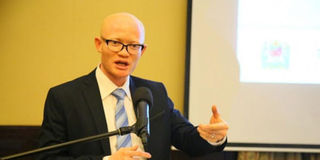Tanzania dismisses human rights abuse allegations at UN forum

Tanzania’s Permanent Representative to the United Nations in Geneva, Ambassador Dr Abdallah S. Possi. PHOTO | COURTESY
What you need to know:
- Ambassador Dr Abdallah S. Possi, dismissed the claims as “erroneous, misleading and misconstrued.”
Dar es Salaam/Geneva. Tanzania has strongly rejected allegations of human rights violations raised at the United Nations Human Rights Council, following a damning statement by the East and Horn of Africa Human Rights Defenders Network and concerns expressed by UN experts over recent incidents involving foreign journalists and human rights defenders.
Addressing the fifth meeting of the 59th session of the Human Rights Council in Geneva, Tanzania’s Permanent Representative to the United Nations in Geneva, Ambassador Dr Abdallah S. Possi, dismissed the claims as “erroneous, misleading and misconstrued.”
Dr Possi said that Tanzania remains fully committed to its constitutional and international obligations on human rights.
He affirmed that the country guarantees freedom of expression—even when it involves criticism of the government—and pointed to Tanzania’s consistent record of holding free and peaceful multiparty elections since the return to pluralism.
“Tanzania has never failed to hold elections as required by the Constitution, and if trends are anything to go by, the same should be expected this year,” he told the Council, referring to the upcoming general elections in October 2025.
The remarks came in the wake of a statement by UN human rights experts calling on Tanzania to halt what they described as a “pattern of repression” involving the enforced disappearance, torture, and harassment of political opponents, journalists, and human rights defenders.
The experts cited the case of Kenyan journalist Boniface Mwangi and Ugandan journalist Agather Atuhaire, who were allegedly abducted in Dar es Salaam on May 19, 2025, while attending the treason trial of opposition leader Tundu Lissu.
According to the UN statement, the two were detained incommunicado, tortured, and later found in border towns in their respective countries—Mwangi in Ukunda, Kenya, and Atuhaire near the Uganda-Tanzania border. Atuhaire reportedly suffered sexual assault during her ordeal.
“These are serious allegations, and we are taking them seriously,” said Dr Possi. “Investigations are ongoing, and if wrongdoing is established, those responsible will be held accountable.”
However, Dr Possi also criticised what he called “alarmist” claims by the human rights group, stating that the individuals in question failed to declare the true nature of their visit—something that violates immigration procedures common to many countries.
He stressed that the trial of Mr Lissu, which the two journalists sought to observe, is publicly accessible and streamed live online, underscoring the government’s commitment to transparency.
Dr Possi further emphasised Tanzania’s ability to maintain national unity and peace across a diverse population, attributing this to the country’s adherence to the rule of law.
He reiterated that all individuals, regardless of background or political leaning, are treated equally before the law.
In their statement, UN experts claimed that more than 200 cases of enforced disappearance have been recorded in Tanzania since 2019, and called on the government to ensure justice, accountability, and support for survivors, especially those who have experienced sexual violence.
They urged Tanzanian authorities to “immediately stop concealing information about those arrested,” and to provide victims with medical, legal, and psychological support.
While Tanzania’s government maintains that it is fully compliant with regional and international human rights frameworks, these recent developments suggest that the country may face heightened scrutiny as the October elections draw nearer.
Dr Possi reaffirmed Tanzania’s commitment to upholding human rights and democratic principles throughout the election period and beyond.
“We remain dedicated to maintaining a peaceful and inclusive political environment where all parties can campaign freely and fairly,” he said.





